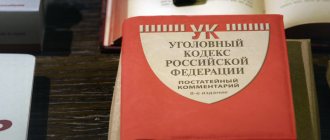1. The use by a private notary or private auditor of their powers contrary to the objectives of their activities and in order to obtain benefits and advantages for themselves or other persons or to cause harm to other persons, if this act caused significant harm to the rights and legitimate interests of citizens or organizations or legally protected interests of society or state -
shall be punishable by a fine in the amount of one hundred thousand to three hundred thousand rubles, or in the amount of the wages or other income of the convicted person for a period of one to two years, or by forced labor for a term of up to three years, with deprivation of the right to hold certain positions or engage in certain activities for a term of up to three years or without it, or arrest for a term of up to six months, or imprisonment for a term of up to three years with deprivation of the right to hold certain positions or engage in certain activities for a term of up to three years.
2. The same act committed in relation to a knowingly minor or incompetent person, -
shall be punishable by a fine in the amount of one hundred thousand to five hundred thousand rubles, or in the amount of the wages or other income of the convicted person for a period of one to three years, or by forced labor for a term of up to five years, with deprivation of the right to hold certain positions or engage in certain activities for a term of up to three years or without it, or arrest for a term of up to six months, or imprisonment for a term of up to five years with deprivation of the right to hold certain positions or engage in certain activities for a term of up to three years.
- Article 201.1. Abuse of authority in the implementation of state defense orders
- Article 203. Excess of authority by a private detective or an employee of a private security organization holding a private security guard certificate when performing their official duties
Commentary to Art. 202 of the Criminal Code of the Russian Federation
The main object of the crime is the normal implementation of private notary and audit activities, since abuse of powers in this area leads to a distortion of its essence, undermines trust and authority in the notary and audit.
An additional object is the rights and legitimate interests of citizens (health, personal integrity) or organizations, or the interests of society or the state protected by law.
Notarial activities in the Russian Federation are regulated by the Fundamentals of the legislation of the Russian Federation on notaries dated February 11, 1993 N 4462-1.
———————————
Gazette of the SND and the Armed Forces of the Russian Federation. 1993. N 10. Art. 357.
According to Art. 1 of this Law, the notary in the Russian Federation is called upon to ensure, in accordance with the Constitution of the Russian Federation, the constitutions of the republics within the Russian Federation, the specified Fundamentals, the protection of the rights and legitimate interests of citizens and legal entities through the performance by notaries of notarial acts provided for by legislative acts on behalf of the Russian Federation. At the same time, notarial acts in the Russian Federation are performed in accordance with the Fundamentals by notaries working in a state notary office or engaged in private practice.
The powers of a notary include performing certain notarial actions in accordance with the procedure established by law. Total st. 35 of the above Law provides for eighteen types of notarial actions. In addition, notaries working in state notary offices perform notarial acts provided for in Art. 35 Fundamentals, and also issue certificates of the right to inheritance and take measures to protect inherited property. If there is no state notary office in the notarial district, the performance of these notarial actions is entrusted by a joint decision of the justice body and the notary chamber to one of the notaries engaged in private practice. A certificate of ownership in the event of the death of one of the spouses is issued by a state notary office, whose competence includes registration of inheritance rights. Thus, in the absence of a public notary in the notarial district, a private notary can perform twenty different types of notarial acts.
The procedure for the execution of their powers by notaries is determined by the Fundamentals of Legislation on Notaries, as well as orders and instructions of the Ministry of Justice of the Russian Federation and still in force orders of the Ministry of Justice of the RSFSR (in particular, the order approving instructions for office work). When performing notarial acts, a private notary must be guided by the legislation of the Russian Federation and its constituent entities.
Auditing activities are regulated by Federal Law of August 7, 2001 N 119-FZ “On Auditing Activities”.
———————————
NW RF. 2001. N 33 (part I). Art. 3422.
According to Part 1 of Art. 1 of this Law, auditing activity, audit is a business activity for independent verification of accounting and financial (accounting) statements of organizations and individual entrepreneurs (audited entities). Part 3 of the same article defines the purpose of the audit, which is to express an opinion on the reliability of the financial (accounting) statements of the audited entities and the compliance of the accounting procedure with the legislation of the Russian Federation. Reliability is understood as the degree of accuracy of financial (accounting) reporting data, which allows the user of these reporting, based on its data, to draw correct conclusions about the results of economic activity, the financial and property status of the audited entities and make informed decisions based on these conclusions.
Thus, auditing activities are aimed at carrying out an independent verification of the audited entities, their creditors, investors, state and public interests.
The objective side of abuse of powers by private notaries and auditors includes:
1) act, i.e. use by a private notary or private auditor of their powers contrary to the objectives of their activities;
2) consequence, i.e. significant harm to the rights and legitimate interests of citizens or organizations or legally protected interests of society or the state;
3) the cause-and-effect relationship between the act and the consequence.
The use by a private notary of his powers contrary to the objectives of his activity consists in the commission of lawful actions within the framework of the rights granted (Article 15 of the Fundamentals) or beyond their limits, as well as actions committed in violation of duties (Article 16 of the Fundamentals). According to the provisions of these articles, the notary is obliged:
1) provide assistance to individuals and legal entities in the exercise of their rights and protection of legitimate interests, explain to them their rights and obligations, warn them about the consequences of performed notarial actions so that legal ignorance cannot be used to their detriment;
2) fulfill their duties in accordance with the above Fundamentals, the legislation of the republics within the Russian Federation and the oath;
3) keep secret information that became known to him in connection with the implementation of his professional activities. The court may release the notary from the obligation to maintain secrecy if a criminal case has been initiated against the notary in connection with the commission of a notarial act;
4) refuse to perform a notarial act if it does not comply with the legislation of the Russian Federation or international treaties;
5) in cases provided for by the legislative acts of the Russian Federation, is obliged to submit to the tax authority a certificate of the value of property passing into the ownership of citizens, necessary for calculating the tax on property transferred by inheritance or gift (for failure to fulfill this obligation, administrative liability is provided in accordance with Part 2 of Article 15.6 of the Code of Administrative Offenses of the Russian Federation).
The use by a private auditor of his powers contrary to the objectives of his activities is understood as the commission of a lawful or unlawful action in violation of the auditor’s duties specified in Art. 5 of the Federal Law “On Auditing Activities”. This rule provides for the following responsibilities:
1) carry out an audit in accordance with the legislation of the Russian Federation and the Federal Law “On Auditing Activities”;
2) provide, at the request of the audited entity, the necessary information about the requirements of the legislation of the Russian Federation relating to the conduct of an audit, as well as about the regulations of the Russian Federation on which the comments and conclusions of the audit organization or individual auditor are based;
3) within the period established by the contract for the provision of audit services, transfer the audit report to the audited entity and (or) the person who entered into the contract for the provision of audit services;
4) ensure the safety of documents received and compiled during the audit, not disclose their contents without the consent of the audited entity and (or) the person who entered into an agreement for the provision of audit services, except for cases provided for by the legislation of the Russian Federation;
5) fulfill other duties arising from the essence of the legal relationship determined by the contract for the provision of audit services and not contrary to the legislation of the Russian Federation.
In some cases, in practice, difficulties arise in qualifying the actions of private notaries and auditors in cases where they perform so-called related functions, deriving income from activities that cannot be recognized as notarial or auditing in the full sense of these concepts. So, in accordance with Art. 15 Fundamentally, a notary has the right to draw up drafts of transactions, statements and other documents. The auditor, in accordance with Art. 1 of the Law “On Auditing” can provide services related to auditing, for example, setting up, restoring and maintaining accounting records, drawing up financial (accounting) statements, accounting consulting; tax consulting; analysis of the financial and economic activities of organizations and individual entrepreneurs, economic and financial consulting; management consulting, including those related to the restructuring of organizations; legal advice, as well as representation in judicial and tax authorities in tax and customs disputes; conducting marketing research, etc.
It is difficult to classify such actions as actions directly constituting notarial and auditing activities. The services listed above are not the exclusive prerogative of private notaries and private auditors. Other persons, both individuals and legal entities, can engage in the same activities. However, these “related ancillary services” should not be qualified under Art. 202 of the Criminal Code of the Russian Federation.
The elements of abuse of power are constructed as material, therefore the crime will be completed from the moment of the onset of socially dangerous consequences, expressed in significant harm to the rights and legitimate interests of citizens or organizations or legally protected interests of society or the state. The concept of significant harm, as in relation to the elements of abuse of power (Article 201 of the Criminal Code of the Russian Federation), is evaluative, and the question of its existence is resolved in a similar way.
The subjective side of this crime is characterized by direct intent. With direct intent, a person, abusing his powers, realizes the socially dangerous nature of his action (inaction), foresees the onset of socially dangerous consequences and desires their occurrence. So, for example, a private auditor, having long-term ties with the bank, gives a fictitious positive opinion about its financial position, foresees that this opinion will attract new depositors to the bank and retain old ones, and wants this. Thus, the rights and legitimate interests of citizens and organizations that make incorrect financial decisions based on unreliable data are violated.
An obligatory element of the subjective side of the crime is the goal of extracting benefits and advantages for oneself or other persons or causing harm to other persons (see commentary to Article 201 of the Criminal Code of the Russian Federation).
The subject of the crime is a special one - a private notary or a private auditor. According to Art. 2 of the Fundamentals of Legislation on Notaries, a citizen of the Russian Federation who has a higher legal education, has completed an internship for a period of at least one year in a state notary office or with a notary engaged in private practice, and has passed a qualification exam, is appointed to the position of a notary in the Russian Federation in the manner established by the Fundamentals. having a license to act as a notary. According to Art. 3 of the Federal Law “On Auditing Activities”, an auditor is an individual who meets the qualification requirements established by the authorized federal body and has an auditor qualification certificate.
State notaries and state auditors are officials and are subject to liability for abuse of power under Art. 285 of the Criminal Code of the Russian Federation.
Part 2 Art. 202 of the Criminal Code of the Russian Federation establishes liability for a qualified crime - the commission of a crime against a knowingly minor or incompetent person.
Abuse of his powers by a private notary or auditor for the purpose of committing other crimes may, if there are grounds for this, require classification as a set of crimes. In particular, as noted in paragraph 24 of the Resolution of the Plenum of the Supreme Court of the Russian Federation dated November 18, 2004 N 23 “On judicial practice in cases of illegal entrepreneurship and legalization (laundering) of funds or other property acquired by criminal means”, the use by a notary of his official authority to certify a transaction that he knows is aimed at legalizing (laundering) funds or other property is qualified as aiding and abetting under Part 5 of Art. 33 of the Criminal Code of the Russian Federation and, accordingly, under Art. Art. 174 or 174.1 of the Criminal Code of the Russian Federation, and if there are grounds for this - under Art. 202 of the Criminal Code of the Russian Federation.
———————————
Bulletin of the Supreme Court of the Russian Federation. 2005. N 1.
Judicial practice under Article 202 of the Criminal Code of the Russian Federation
Appeal ruling of the Judicial Collegium for Criminal Cases of the Supreme Court of the Russian Federation dated September 14, 2018 N 4-APU18-28SP
- under Part 2 of Art. 202 of the Criminal Code of the Russian Federation for 2 years of imprisonment with deprivation of the right to engage in notarial activities for a period of 2 years 6 months. In accordance with Part 3 of Art. of the Criminal Code of the Russian Federation for a set of crimes by partial addition of punishments, finally for 5 years 6 months of imprisonment to be served in a general regime correctional colony, with a fine of 400,000 rubles, with deprivation of the right to engage in notarial activities for 2 years 6 months, with restriction of freedom for 9 months, with the establishment of restrictions in the form of a ban on changing one’s place of residence without the consent of the criminal-executive inspection, as well as traveling outside the municipality in which the place of permanent residence is located, without the consent of the criminal-executive inspection, with the imposition of an obligation to appear once a month for registration with the criminal-executive inspection at the place of residence.
Resolution of the Supreme Court of the Russian Federation dated August 16, 2017 N 81-UD17-4
convicted under Part 1 of Art. 202 of the Criminal Code of the Russian Federation to a fine of 150,000 (one hundred and fifty thousand) rubles to the state, with exemption from the imposed punishment due to the expiration of the statute of limitations for criminal prosecution. It was decided to recover from Radyakina O.I. in favor of P. in compensation for moral damage 30,000 (thirty thousand rubles) and recognize for P., as a civil plaintiff, the right to satisfy a civil claim for compensation for property damage caused by a crime in civil proceedings.
Resolution of the Plenum of the Supreme Court of the Russian Federation dated June 29, 2021 N 21
In order to ensure uniform application by courts of legislation on criminal liability for crimes against the interests of service in commercial and other organizations, provided for in Articles 201, 201.1, 202, 203 of the Criminal Code of the Russian Federation, the Plenum of the Supreme Court of the Russian Federation, guided by Article 126 of the Constitution of the Russian Federation, Articles 2 and 5 of the Federal Constitutional Law of February 5, 2014 N 3-FKZ “On the Supreme Court of the Russian Federation”, decides to give the following clarifications to the courts:
Judicial practice: sentences and punishment under Art. 202 of the Criminal Code of the Russian Federation
- Resolution of the Plenum of the Supreme Court of the Russian Federation dated... PLENARY OF THE SUPREME COURT OF THE RUSSIAN FEDERATION DECISION dated December 27, 2002 N 29 ON JUDICIAL PRACTICE IN CASES OF THEFT,...
- Resolution of the Plenum of the Supreme Court of the Russian Federation dated... PLENARY OF THE SUPREME COURT OF THE RUSSIAN FEDERATION DECISION of November 15, 2016 N 48 ON THE PRACTICE OF APPLICATION BY COURTS OF LEGISLATION GOVERNING FEATURES...
- Resolution of the Plenum of the Supreme Court of the Russian Federation dated... PLENAUM OF THE SUPREME COURT OF THE RUSSIAN FEDERATION DECISION dated June 25, 2022 N 18 ON JUDICIAL PRACTICE IN CASES OF CRIMES,...
- Resolution of the Plenum of the Supreme Court of the Russian Federation dated... PLENAUM OF THE SUPREME COURT OF THE RUSSIAN FEDERATION DECISION dated December 17, 2022 N 43 ON SOME ISSUES OF JUDICIAL PRACTICE IN CASES...
- Decision of the Supreme Court: Determination N 203-APU17-21... THE SUPREME COURT OF THE RUSSIAN FEDERATION Case No. 203-APU17-21 APPEAL DECISION Moscow August 31, 2022 Judicial Collegium for Military Personnel of the Supreme...
- Resolution of the Presidium of the Supreme Court of the Russian Federation dated... PRESIDIUM OF THE SUPREME COURT OF THE RUSSIAN FEDERATION DECISION dated December 5, 2018 N 126-P18 ON RESUMING PROCEEDINGS IN THE CASE DUE TO NEW...
- Ruling of the ECtHR dated 02/14/2017 EUROPEAN COURT OF HUMAN RIGHTS THIRD SECTION CASE “MASLOVA VS. RUSSIAN FEDERATION” (Complaint No. 15980/12) JUDGMENT…
- Decision of the Supreme Court: Resolution No. 310P13 dated... DECISION OF THE PRESIDIUM OF THE SUPREME COURT OF THE RUSSIAN FEDERATION Case No. 310-P13 Moscow January 23, 2014 Presidium of the Supreme Court of the Russian Federation...
- Decision of the Supreme Court: Determination No. 56-КГ16-46 dated... THE SUPREME COURT OF THE RUSSIAN FEDERATION No. 56-КГ16-46 DETERMINATION Moscow March 6, 2017 Judicial Collegium for Civil Cases of the Supreme Court...
- Decision of the Supreme Court: Determination No. 56-КГ16-46 dated... THE SUPREME COURT OF THE RUSSIAN FEDERATION No. 56-КГ16-46 DETERMINATION Moscow March 6, 2017 Judicial Collegium for Civil Cases of the Supreme Court...




